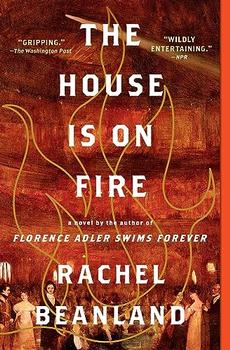Summary | Excerpt | Reviews | Beyond the Book | Readalikes | Genres & Themes | Author Bio

Sally's own education was devoid of Diderot or Rousseau or any of their contemporaries. Her father, for all his intellect, had not been a particularly learned man. He was an excellent orator and statesman, but his arguments didn't come from what he read in books so much as what he read on people's faces. He'd practiced law without much of a legal education, then served in the House of Burgesses before the Revolution. There had been two terms as governor and a stint in the Virginia House of Delegates, and while his political life had given him plenty of wisdom to impart to his children, he was much more likely to be found rolling around on the floor with them than teaching them anything useful.
Sally's brothers' education had been outsourced. Private tutors instructed the boys in Latin and Greek, history and geography, until they were ready to attend Hampden-Sydney College, where none of them had proved to be especially fine students. Sally and her sisters were instructed by their mother, Dorothea, who read little besides The Art of Cookery, but had managed that singular and spectacular feat of catching a husband equal to her in wealth and rank, which—in her opinion—made her eminently qualified to educate her daughters. Dorothea taught her girls to read and write, produce neat stitchwork, and paint periwinkles and pansies that didn't drip down the paper-thin edges of porcelain teacups. She hired a neighbor to give the girls lessons on the pianoforte and a dancing instructor who came all the way from Lynchburg to teach all the children how to dance a proper minuet.
It was Robert who had plugged the holes in Sally's education. The first time he'd ridden out to Red Hill, to introduce himself to her father and to make a pitch for the new company store he was running in Marysville, he'd spent several minutes inspecting her father's small library. The bookshelves contained legal treatises and law dictionaries, but few novels and almost no poetry or plays. Sally had been reading on the settee in the parlor when he arrived, and she stayed put when her father went looking for his ledger.
"Have you read these?" Robert asked, running his hands along the eight leather-bound volumes of Samuel Richardson's Clarissa.
"All of them," said Sally, watching him from across the room. "Twice."
Robert looked up at her, amused. "Pamela, too?"
"Don't be confused," said Sally. "I much prefer novels that don't relegate women to housewifery. But they're few and far between. And given our geography, I'm not in a good position to be choosy."
Robert looked out the window, in the direction of the carefully manicured boxwoods, which bordered a path that led across the yard, past the slave cabins, and down to the tobacco fields. Beyond the fields, the Roanoke River wound its way across Virginia's Southside and all the way to the North Carolina coast. "I suppose it probably is quite difficult to get books out here," he said.
Sally studied him. She guessed he was ten years older than her, although at seventeen, she was a very bad judge. His hair was still dark, but his skin betrayed either age, hard use, or both.
When he abandoned the window and turned to face her, his eyes gleamed. "So, if not dutiful wives, what kind of heroines do you prefer?"
She revealed the book she had tucked into her skirt when he entered the room, and he moved a little closer, squinting at the stamped foil on the cover.
"Charlotte Temple?"
"Susanna Rowson's very clever, I think."
"I think so, too, but if you don't like dutiful housewives, you can do better than reading about poor Charlotte's downfall."
"You've read it?"
"Aye."
"Most of the men I know won't touch a novel, let alone one written by a woman."
"Why not?"
"They say they're a corrupting influence."
"Corrupting to whom?" said Robert, a hint of a smirk at the corner of his mouth.
Excerpted from The House Is on Fire by Rachel Beanland. Copyright © 2023 by Rachel Beanland. Excerpted by permission of Simon & Schuster. All rights reserved. No part of this excerpt may be reproduced or reprinted without permission in writing from the publisher.
If there is anything more dangerous to the life of the mind than having no independent commitment to ideas...
Click Here to find out who said this, as well as discovering other famous literary quotes!
Your guide toexceptional books
BookBrowse seeks out and recommends the best in contemporary fiction and nonfiction—books that not only engage and entertain but also deepen our understanding of ourselves and the world around us.